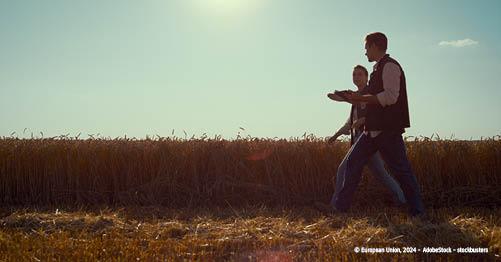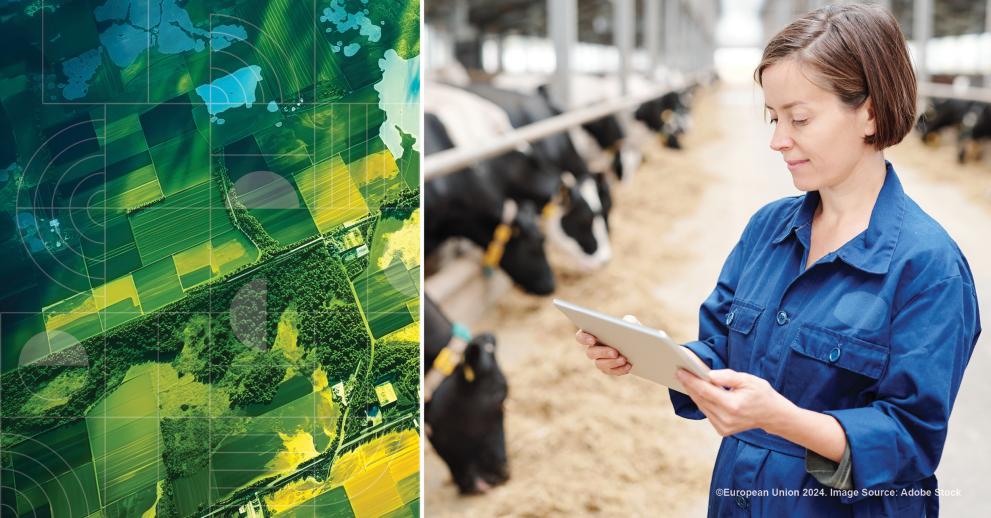The European Commission has listened closely to the concerns expressed by farmers and EU countries and worked hard to deliver swift and concrete actions to respond to the issues raised.
Simplification of the European policies on agriculture is a constant priority, at both EU and national level. The delivery model of the current common agricultural policy (CAP), based on CAP Strategic Plans designed and implemented at national level, already represents a step forward in terms of simplification and increased subsidiarity compared with the previous period.
EU countries play a key role in keeping the administrative burden for farmers limited and proportionate. Any successful simplification exercise must be carried out in close cooperation with the national administrations and farmers themselves.

The Commission is taking strong and swift action to support our farmers in a time when they are dealing with numerous challenges and concerns. Our proposals – crafted in close cooperation with farmers, key stakeholders, our Member States and MEPs – offer targeted flexibilities to help farmers do their vital work with greater confidence and certainty. Agricultural policy adapts to changing realities while staying focused on the key priority of protecting the environment and adapting to climate change. The Commission will continue to stand steadfastly by our farmers, who maintain EU food security and serve at the frontline of our climate and environment action.
Simplifying the policy and providing more flexibility to farmers
In the first year of implementation of the current CAP (2023-27), EU farmers faced challenges to fully comply with some of the standards beneficial to the environment and climate called good agricultural and environmental conditions (GAECs). Delivering on its commitment to ease administrative burden for EU farmers, the Commission proposed on 15 March 2024 to change certain provisions of the common agricultural policy (CAP) related to conditionality and CAP Strategic Plans.

These proposals aim to:
- reduce the burden related to controls for EU farmers
- provide them with greater flexibility for complying with certain environmental conditionalities.
The changes to current CAP rules result in:
- more flexibility for farmers and national administrations
- requirements more compatible with farming realities.
The simplification measures are carefully calibrated, and targeted to maintain a high level of environment and climate ambition in the current CAP.
These proposals were voted on 24 April 2024 by the European Parliament, and entered into force on 25 May 2024, after their final adoption by the Council. They apply retroactively to EU farmers to cover the year 2024. The Commission took stock of progress in implementing the simplification package. It outlined the key challenges, the process, the results of the consultations that fed into the package, and the different options considered.
In addition to the legislative review of the CAP with the European Parliament and the Council, the Commission took measures directly responding to EU countries’ request to review the methodology for certain checks. The Commission’s clarification on how to assess the quality of the Area Monitoring System and how to use geo-tagged photos will result in a reduction of the number of on-farm visits by national administrations by up to 50%. With fewer visits from the administration to manage, farmers will have more time to dedicate to their core work.

The Commission also took other short-term actions:
- The change of the requirement to maintain permanent grassland (GAEC 1) to cater for cases of structural changes in farming, in particular where farmers no longer have livestock.
- A clarification of the use of the concept of force majeure and exceptional circumstances to improve the certainty of getting CAP support for farmers impacted by unfortunate events outside their control, such as severe drought or floods.
- The increase of the number of amendments allowed each year for CAP Strategic Plans so EU countries can adapt more frequently their support measures to changing conditions. The approval process of amendments to CAP Strategic Plans is also being simplified.
From 7 March to 8 April 2024, the European Commission launched an online survey in all EU languages to gather directly the views of EU farmers. It received close to 27 000 replies.
This survey helps to identify the sources of administrative burden and complexity stemming from CAP rules as well as other rules for food and agriculture. It will feed into a detailed analysis to be published in Autumn 2024, aiming to clarify the sources of complexity for farmers: EU level, national level, CAP, and other requirements and policies.

Timeline
- 10 December 2024
- 24 April 2024
Vote by the European Parliament on the legislative review of the CAP presented by the Commission
- 13 February 2024
Strengthening the position of farmers in the food supply chain
Reinforcing the position of farmers in the food supply chain is one of the key objectives of the CAP. While the degree of trust and cooperation between actors in the chain is increasing thanks to several measures already in place at EU level, the full implementation and enforcement of the available policy tools take time, and more needs to be done.
The Commission presented to the Council and the European Parliament several actions.
Setting up the EU agri-food chain Observatory (AFCO) to bring increased transparency on prices, and structure of costs and distribution of margins and added value in the supply chain.
- Presenting a report on the implementation of the Directive on unfair trading practices (UTP) in the food supply chain.
Proposing targeted changes to the Regulation establishing a common market organisation of agricultural products (CMO) to further correct imbalances in the food supply chain. New rules on contracts concluded between farmers and buyers are expected and a strengthening of producer organisations to allow farmers to cooperate and act collectively in a more effective way.
Introducing new rules on cross-border enforcement against unfair trading practices to enhance the cooperation of national enforcement authorities, notably by improving the exchange of information and collection of penalties.
- Reviewing existing policy to assess if more legislative proposals are needed.The Commission will present in 2025 a thorough evaluation of the Directive on unfair trading practices in the food supply chain, in force since 2021.


